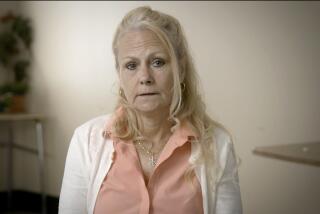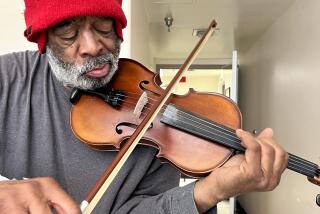An Unsolved Death : Nursing Home Patient, 74, Died ‘at Hands of Another,’ Coroner’s Inquest Finds; Police Investigation Stymied
- Share via
Aubrey Fanning was full of life when Pamela Mitchell took three of her children to visit her grandfather at a Long Beach convalescent hospital one evening last December. Fanning, 74, teased his great-grandchildren by tugging on their fingers and he sipped a strawberry milkshake Mitchell had brought along.
Just hours after the visitors left, Fanning slipped into a coma and was rushed to Memorial Medical Center of Long Beach. Mitchell said officials at the convalescent home told her the man had broken a blood vessel in his brain.
But when Mitchell saw her grandfather, she suspected something was amiss. Fanning had a moon-shaped bruise next to his right eye, a bruise the size of a grapefruit on his chest and other bruises on his hands and legs.
Aubrey Fanning looked like he had been beaten, she said.
After lingering in a coma for another nine days, Fanning died Dec. 21. The coroner’s office listed the death as accidental, but Mitchell was sure there was a more sinister explanation.
Called for Inquest
Deputy Dist. Atty. Lee Harris agreed the case had a “certain odor to it” and called for a coroner’s inquest, only the second in Los Angeles County this year. A coroner’s inquest is an investigation into the cause of a suspicious death.
On Monday, the seven-member coroner’s jury--a lay panel convened for the inquest--agreed with Mitchell and Harris. After listening to testimony, the jury ruled that Fanning had died at the hands of another.
“His death was devastating and untimely,” said Mitchell, a San Pedro resident. “As far as I’m concerned, he should still be here.”
The ruling also added a twist to a medical and legal whodunit that has troubled investigators and hospital officials since the elderly man’s death.
In February, Long Beach police homicide detectives arrested Lito Aqui, 25, a certified nursing assistant at Hillcrest Convalescent Hospital, and booked him on suspicion of murder in the Fanning case. Three days later, Aqui was released from jail when the district attorney’s office decided not to charge him with the crime because of insufficient evidence.
During the coroner’s inquest, however, Aqui again became the focus of attention. Prosecutors put the naturalized U.S. citizen on the stand to question him about his involvement with Fanning, but Aqui refused to answer questions, citing his Fifth Amendment right to avoid self-incrimination.
Although authorities say the case remains under investigation, they admit they lack sufficient evidence to file murder charges against Aqui or anyone else. Nonetheless, officials maintain that the inquest was an important step.
‘Should Not Have Died’
“Even without a criminal prosecution, we want to air these types of incidents,” said Harris, who heads the district attorney’s nursing home and dependent care section. “We don’t want these types of deaths to be swept under the rug. Mr. Fanning should not have died at that time and at that place.”
But a lawyer representing Aqui said the inquest had been a waste of time.
Joseph Shemaria, a Beverly Hills lawyer, called the coroner’s inquest “a mockery” and charged that the hearing was orchestrated by police investigators “in a vain attempt to get Lito Aqui to incriminate himself in their eyes.”
“It’s a kangaroo advisory board, sitting there to give a kangaroo’s opinion,” Shemaria said. “They’re making much ado about nothing. And they’re driving this poor kid insane. He’s frightened out of his mind.”
Friends of Aqui, who is married to a registered nurse at Hillcrest and has a 6-month-old daughter, said the young man was devastated by the inquest, has refused to eat in recent days and often breaks into fits of crying.
The inquest was painful for Fanning’s family as well. After the hearing, Mitchell stood in the courtroom with her mother, Dorothy Morrissette, and wept. Mitchell was raised by Fanning and his wife, Hilda, after her mother--Fanning’s daughter--and father were divorced.
Took Family West
Fanning left the coal fields in which he had worked in West Virginia in 1949, gathered up his family and headed west, looking for a better life. He worked in a San Pedro lumberyard until he slipped a disk in the mid-1960s and had back surgery.
By 1977 Parkinson’s disease--a degenerative disorder that causes muscle tremors--had grown so bad that the family placed Fanning in Hillcrest, a 154-bed facility. His wife died in 1981.
Despite a sometimes crusty nature, the wheelchair-bound Fanning was “as sharp as a tack” and got along well with the nurses and aides at Hillcrest, Mitchell said.
“Through all his years there, I could tell the whole staff liked him,” Mitchell said. “He was an ornery old guy, but he was fun-loving.”
Hillcrest spokesmen agreed that Fanning was a generally likeable patient, although he could sometimes be cranky.
Aqui began working at Hillcrest in April, 1984, and continued until June, when he was subpoenaed for the inquest, according to Richard Wolfe, regional supervisor for the county Health Facilities Division. Wolfe said that at that time he was put on an “on call” list by Hillcrest, but that he has not been called back to work.
Homicide detectives on Monday said Aqui and Fanning had a confrontation the night that the elderly man slipped into a coma. According to police, Aqui painted the following picture of that episode:
At 9 p.m., about three hours after Pamela Mitchell had left her grandfather, Fanning turned on his call light and asked Aqui to change his soiled bed sheets. Aqui told Fanning he did not have time and left, but the elderly man continued to turn on the call light.
After responding several times, Aqui moved Fanning’s bed away from the call light. When Aqui came to change the sheets about 9:30 p.m., Fanning tried to hit the nursing assistant with a portable urinal, a small plastic cylinder that resembles a Thermos bottle.
Incident Went Unreported
Aqui said he tried to block the blow and held Fanning down with the sheets as the elderly man thrashed about. When Fanning calmed down, Aqui changed the sheets, moved the bed back near the call light and left. He did not report the incident to his supervisor because he did not think it was important.
Deputy Dist. Atty. Harris said Fanning began complaining of headaches and dizziness a few hours later. The nursing staff gave Fanning Tylenol and left him alone for a little while, Harris said. When they checked back, Fanning had vomited and his blood pressure had become abnormal.
At Memorial Medical Center, doctors immediately diagnosed Fanning as having suffered “acute subdural hematoma,” or bleeding in the brain.
During testimony Monday, Dr. Lakshmanan Sathyavagiswaran, a senior medical examiner with the county coroner’s office, explained that Fanning’s brain began to bleed because it banged against the inside of his skull due to “blunt force trauma.”
Dr. Gerald Gagnon, the private physician who cared for Fanning at Hillcrest, said the elderly man might have inflicted his injuries by thrashing in bed and the bruise to the chest could have been caused by Fanning’s hitting himself with the portable urinal. During questioning by Harris, Gagnon acknowledged that he had not read the coroner’s report when he reached his hypothesis.
Sathyavagiswaran said it was unlikely that Fanning could have banged his head because of the tremors he suffered with Parkinson’sdisease. In addition, the coroner’s examiner cast doubt on the theory that the numerous bruises on Fanning’s body might have been self-inflicted.
Police investigators first began questioning Aqui three days after Fanning died. Detective George Fox testified that investigators asked Aqui to take a lie detector test on Feb. 19; when he failed the examination, police arrested him.
Results Not Infallible
Shemaria, Aqui’s attorney, criticized police for raising the issue of the polygraph during the inquest, noting that such evidence cannot be presented during a criminal trial because the tests are not infallible.
“It’s a total joke to let a jury hear that a person flunked a lie detector test or hear him take the Fifth,” Shemaria said. “When you’ve got a jury that has heard that kind of poisonous garbage, all you have to do is give them 15 minutes and of course they’ll return with that kind of verdict. I’m sure that if they could have found Lito Aqui guilty of murder they would have done that, too.”
Officials at the county Health Services Department say they are going to ask state authorities to strip Aqui of his certification as a nursing assistant.
In addition, Ralph Lopez, chief of the county Health Facility Division, said that his division on Thursday began the formal process of serving Hillcrest with a citation that accuses the facility of allowing physical harm to occur to a patient. The citation could carry a fine of $5,000.
James Zisman, chief administrator at Hillcrest, said the convalescent hospital would fight the citation.
“We don’t feel that we did anything wrong,” Zisman said.
He said Lopez was undertaking the disciplinary action because “this is his job to issue citations. He has to show he’s doing something.”
For Mitchell, the action being considered taken against Aqui is a salve for the hurt. But she said that nothing can compensate for the loss of her grandfather.
“He just didn’t deserve to go that way,” she said. “He deserved to go to sleep one night and not wake up.”
More to Read
Sign up for Essential California
The most important California stories and recommendations in your inbox every morning.
You may occasionally receive promotional content from the Los Angeles Times.













